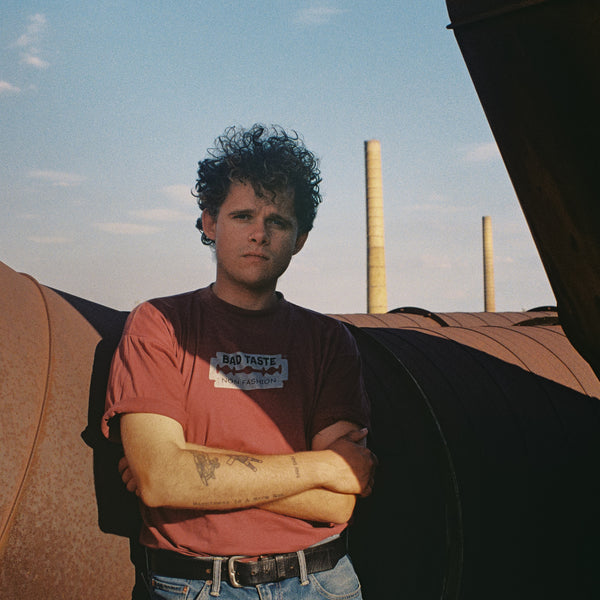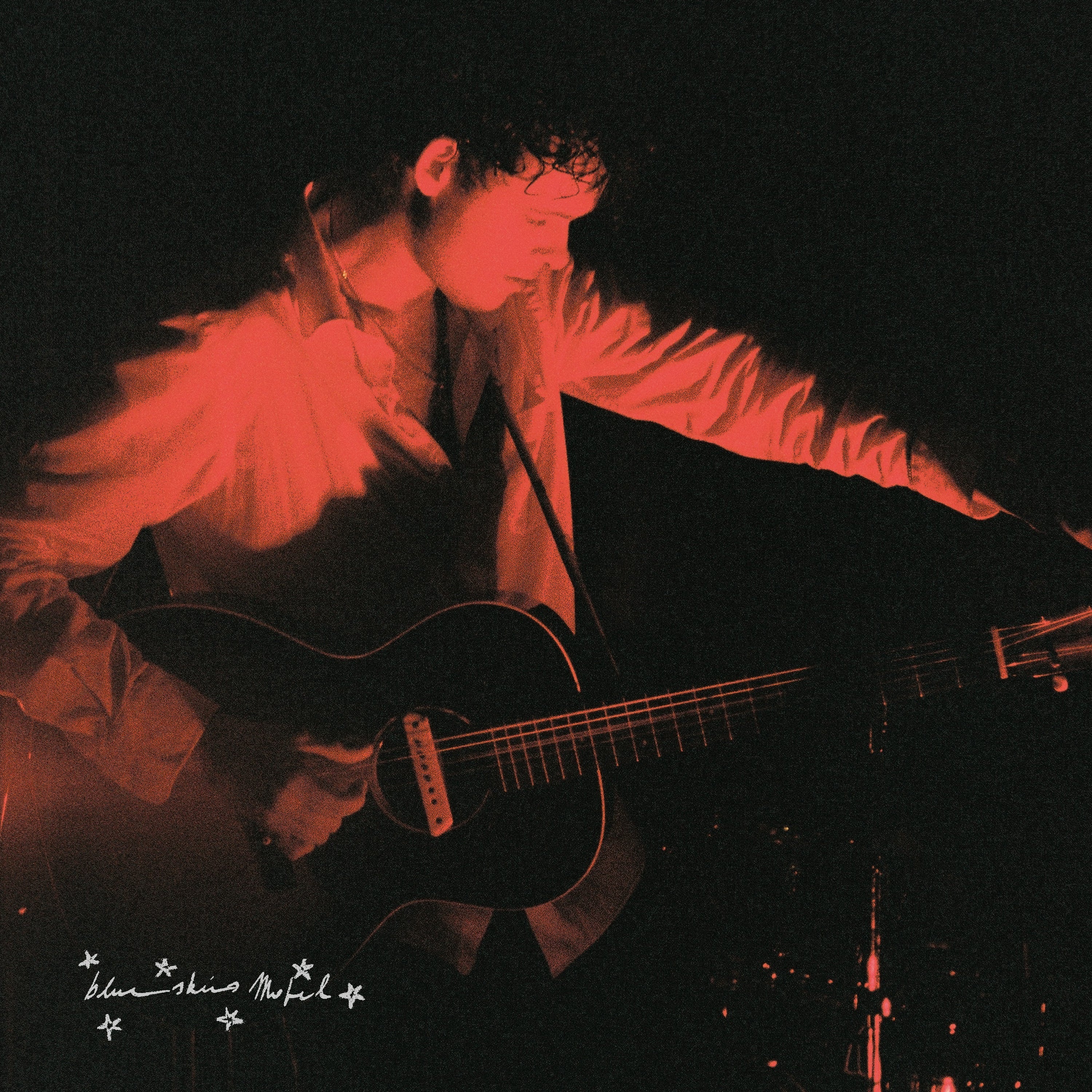Máni Orrason
There are albums that work a little differently in their reception. They refuse to answer the classic questions of pop critics: Is the songwriting any good? How should the vocal performance be assessed? What are the production values? One of the best examples of this thesis is "Carrie & Lowell" by Sufjan Stevens. Recorded largely with a smartphone, a fragile voice, little more than guitar and vocals, but heaven help - how intensely this record rips your heart out! The new album by the Icelandic-born, Berlin-based singer/songwriter Máni Orrason also makes you think about elusive words like "aura", "atmosphere" and - God forbid - "authenticity".
It starts in the first few seconds of “Blue Skies Motel”: we hear a good 80 seconds of the single “Adore You”. In a version that Orrason calls “(sleepy)”. That is – to put it mildly – brave, because you don’t want to associate emotional music with sleepiness. But this is exactly where this song sketch makes perfect sense: the sound of Orrason’s guitar playing sets the melancholic mood of the album, he seems to intuitively pick the right chords, his voice is cautious, searching, tender at first, until you taste the right words, the right melody for the first time and it all comes together perfectly in the way he sings “I adore you”. You quickly notice that this unusual introduction reads more like an instruction manual. Or, because that sounds a little bureaucratic: like an invitation – into his inner circle, his work process, the intimate surroundings of his studio.
The best place to meet Maní Orrason is very close to this studio. He is one of the numerous artists who have had a rehearsal room in the old radio house on Nalepastrasse in Berlin for years. The original radio studios of the GDR have been a popular address for musicians since the mid-2000s - the most famous resident there is probably Nils Frahm. During an interview in the beer garden of the radio house on a beautiful late summer day, Orrason says: "For many of these songs, it was actually the case that I made music right after I woke up in the morning. So before my first coffee and before I put in my contact lenses. I pressed 'Record', played the guitar, didn't really think about what I was doing and started singing." He was in a kind of "dream state" in which his subconscious was still very active. "The rational part of my brain that tries to make decisions or edit is not very active yet. In this state, it seems to me as if it is easier for me to say or sing interesting things.” Later, he listened to these recordings, wrote down the words, tried to find meaning in them – and finally began the process of actual editing and songwriting.
When you listen to the nine songs plus the "(sleepy)" sketch of "Blue Skies Motel", you quickly sink into this special mood - and at some point, lost in the most beautiful melancholy, you ask yourself: Huh? Is THAT actually the Maní Orrason I thought I knew? Of course, the Icelander has always been good at melancholic, emotional songwriting. Just think of his early, piano-heavy single "I Woke Up Waiting", which is also the title song of the album of the same name. Or the wonderful "Whit Slugs", which quietly concluded his last album "THE WORLD IS BIG AND YOU WILL NEVER FIND ME". But those were always the exception. This last album in particular had dazzling electropop bangers like the distressed "I Don't Wanna Be A Star", pop punk with an 80s vibe like "Dreama" and "Change The World". Perhaps his best known songs, such as "I Swear It's True" and "Numb," are welcome additions to playlists like "Feelgood Indie," where they fit in mood-wise. So what was going on that made him reinvent himself a little? Máni Orrason explains it like this: "Some of these songs were written before the last album was finished. That must have been around winter 2021. Actually, the album closer 'White Slugs' is also one of those more stripped-down songs - which, looking back, makes a very nice connection." This mood and this way of writing was something he wanted to explore further. "To be honest, it was the only thing that made sense to me after that. I somehow struggled with the last album. It was so extensive and the production and style were so ambitious. It also took a long time to finalise it and I felt like I was having a hard time doing justice to that version of myself." The images, videos and songs from that time show an extroverted, charismatic pop artist who ironically plays with the really big gestures. Today Máni Orrason says: "When I thought about my daily life as a musician, about what I do, what I think and how I feel, I realised that sitting in the studio with a guitar and playing quietly is much closer to me than the 'larger than life' version of myself that I wanted to show on the album and on stage."
Anyone who makes music in this "quiet" way is of course faced with completely different challenges. Máni Orrason knows this too: "I hate it when people say that every good song has to work on an acoustic guitar. But for me that was somehow the standard. You have very limited resources, there is so little room for things that grab your attention. I loved writing these songs. You put so much effort into every line, into the feeling behind the words, into the mood of the performance. It's like carving a work of art very slowly, instead of just piling up nice-sounding things on top of each other to make it seem big. I felt like I was finding a new voice for myself as a songwriter." Máni Orrason says all these print-ready things in a rather casual way during the interview. It almost seems as if he also finds the ideas behind his songs in the same way that he finds the songs themselves. But Orrason is also aware of the pitfalls of this sound and this way of working: "There is a very fine line between being a sensitive man and becoming one of those emotionally manipulative 'emo sad boys'." Suffice it to say: Máni Orrason did not fall into this trap. This could also be because he saw the last Adrienne Lenker album rather than the early Bright Eyes records as a reference.
"Blue Skies Motel" is named after the poem of the same name by Robert Creeley, which Máni Orrason found in an anthology of American poets - a book that has a permanent place in his rehearsal room and always provides him with inspiration. The poem by Robert Creeley, who was born in Arlington, Massachusetts in 1926 and died in 2005, is a very pointed motel scene sketched in free verse, permeated by a melancholy that is often found in New England poetry and literature. A mood that seems very similar to the one Máni Orrason created in his radio house rehearsal room. Like Creeley, Orrason serves up his poetically captured stories and images with the dirt of reality. "I Do", song 2 on the album and another single, was the first one he wrote for the album. And it was inspired by this poem, he says: "In it, Creeley describes how he looks at a chimney, which he finds 'phallic', and sees clouds in the sky that look like a pile of pillows. There is another poem in the book where he describes how he shyly pees in a sink in front of a lover. I found that scene fascinating, which is why it is so similar in 'I Do'." But Orrason particularly liked the concept of the motel. "I imagined what it was like to be alone in a motel, or in different places, and to look out the window and see children playing by the pool, or, you know, what it is like to travel alone."
You could actually hear "Blue Skies Motel" as the journey of a young man traveling around the USA for a while, stopping in cheap motels to reflect on his life and loves so far. As in the wonderful "Crush," he thinks back to past love affairs in Berlin that happened during that not-so-healthy phase of life that every young person probably goes through for a while in their first years in Berlin. "So when I told you that I loved you on the Berghain floor / you got so weird, I really wished they stopped me at the door," he sings. "I think a lot of the songs revolve around what I sometimes call my 'dark Berlin years'." For him, they began shortly after the pandemic, when he ended a long relationship. "I thought to myself: Now it's time to go to all the parties and all the clubs! I did that for a while, chasing the night, so to speak. Instead of permanent euphoria, I often felt a certain sadness." The song "I Was On The Moon" also deals with this feeling of coming down. "You are in all these exciting places and at all these parties... But then, whatever you experienced there, you go back to your little room and are completely yourself again - and realize that you actually felt lonely at the party." But there are also more uplifting moments on the album. "Adore You", for example - the single that we hear as an intro - is a melodic meditation that repeatedly revolves around the astonishing realization that you can admire or even idolize a person full of love. The way Máni Orrason emphasizes these three words, transforms them into pure melody, and dreamily extends the "you" by a few syllables - that is as simple as it is impressive. The third single "She Calls Me Baby" is also a tender, thoughtful song that crawls right under the skin and from there into the heart.
Listening to "Blue Skies Motel" is a bit like sitting with Máni Orrason and his fellow musician and co-producer Yannick Ernst in their rehearsal room for a good 40 minutes and listening to a very intimate performance. That is exactly what Orrason wanted to achieve, he says - and yet he sees no contradiction in the fact that he is already looking forward to the concerts for the album. "I think they will be very special evenings," he says. "I have played a few acoustic concerts in my life where I felt like I was both a performer and part of the audience." With this album he has found the perfect music for it, he says - and he is already looking forward to seeing this statement confirmed in front of a stage soon.



